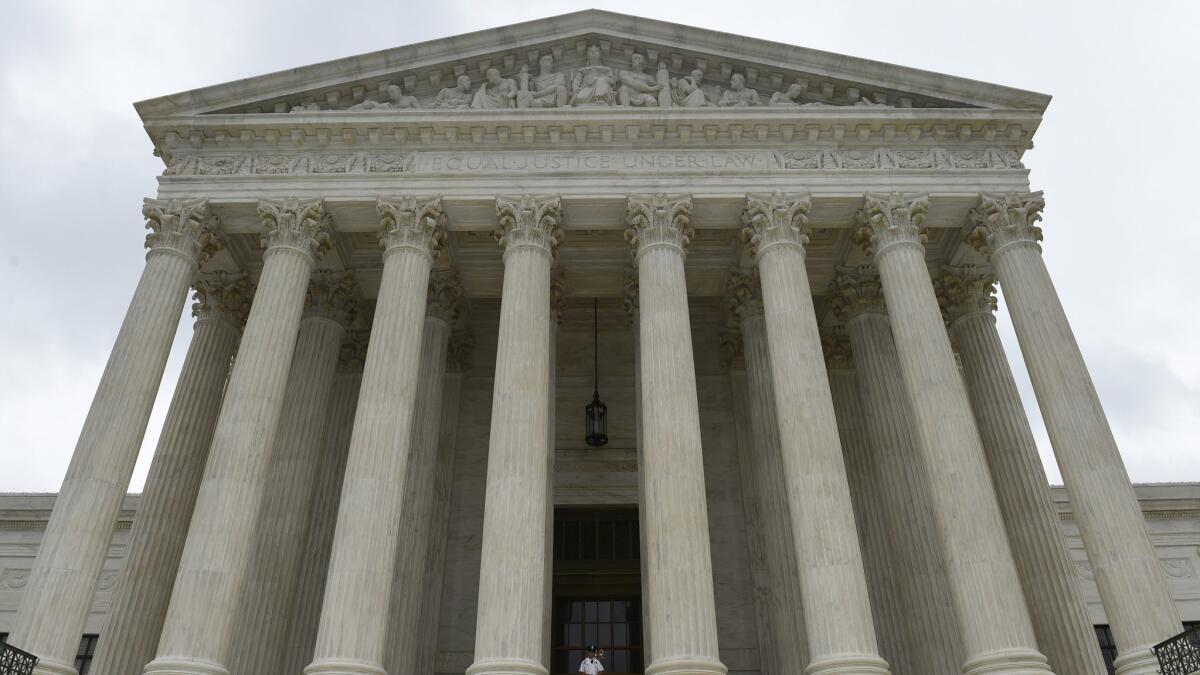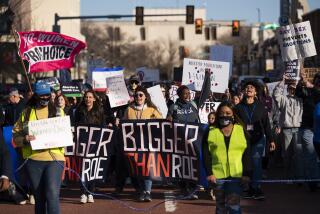Supreme Court weighs whether to hear first challenge to Roe vs. Wade since Kavanaugh joined bench

- Share via
Reporting from Washington — The Supreme Court on Friday weighed whether to hear a case involving the landmark Roe vs. Wade decision, the first direct challenge to abortion rights the court has faced since Justice Brett M. Kavanaugh took his seat.
The case involves an appeal from Indiana, which seeks to enforce a state law that forbids abortions by women who cite Down syndrome, or the sex or race of the fetus, as a reason for ending a pregnancy.
Justices reviewed the matter privately Friday but were not expected to announce whether they will take the case until next week at the earliest.
When Justice Anthony Kennedy was on the court, state lawyers did not seek to challenge Roe vs. Wade, since Kennedy had voted to uphold the right to abortion decades before. But Kavanaugh, who replaced Kennedy on the court, has been seen as more conservative and open to limiting or overturning the right to abortion.
Indiana wasted no time in lodging its appeal. On Oct. 12, a week after Kavanaugh was sworn in, state lawyers urged the court to revive a 2016 state law and “uphold Indiana’s authority to put end to eugenics abortions.”
The state’s appeal argues that “technological advances have improved...prenatal testing that screens for Down syndrome and other fetal abnormalities,” resulting in most women choosing abortion when they receive such a diagnosis.
The law, signed by then-Gov. Mike Pence, “responded to the alarming trend of disability-selective abortions” by making it illegal for women to seek to end a pregnancy based on a “diagnosis or potential diagnosis of the fetus having Down syndrome or any other disability.” The only exception would be for a “fetal condition that...will with reasonable certainty result in the death of the child not more than three months after the child’s birth.”
A federal judge blocked the law from taking effect in 2016, and the 7th Circuit Court in Chicago in a 3-0 ruling declared it unconstitutional. The judges said the Supreme Court’s past rulings, beginning with Roe vs. Wade, made clear that a woman and her doctor, not the state, may decide whether to abort a pregnancy before the fetus is capable of living on its own.
But in June, two of President Trump’s new appointees, including Judge Amy Coney Barrett, joined a dissenting opinion that urged the appeals court to reconsider its ruling. Judge Frank Easterbrook said the Supreme Court had not directly ruled on a “eugenics statute” like the Indiana law.
“There is a difference between ‘I don’t want a child’ and ‘I want a child but only a male’ or ‘I want only children whose genes predict success in life,’ ” he wrote.
A separate provision of the law would have required abortion facilities, including Planned Parenthood clinics, to dispose of fetal remains through burial or cremation, and not as medical waste. But the appeals court was split 5-5 and could not reopen the case.
Indiana’s lawyers then asked the Supreme Court to review the case of Box vs. Planned Parenthood of Indiana. They said several other states, including Ohio, have adopted similar laws, but none of them have gone into effect.
Jennifer Dalven, an ACLU lawyer, said she thought it was “very unlikely to the court will take the case. There is no split in the circuit courts on this question, which is a typical reason the court takes cases. And allowing a state to pry into a woman’s reason for seeking an abortion strikes at the very heart of the woman’s right to make this private decision for herself.”
In their meeting behind closed doors, the justices also considered dozens of other appeals.
Last month, the justices split 6-3 in refusing to hear an appeal from several conservative states, including Indiana, that sought to deny Medicaid funds to Planned Parenthood clinics. Justices Clarence Thomas, Samuel A. Alito Jr. and Neil M. Gorsuch dissented. But it takes four votes to grant an appeal.
More stories from David G. Savage »
Twitter: DavidGSavage
More to Read
Get the L.A. Times Politics newsletter
Deeply reported insights into legislation, politics and policy from Sacramento, Washington and beyond. In your inbox three times per week.
You may occasionally receive promotional content from the Los Angeles Times.











